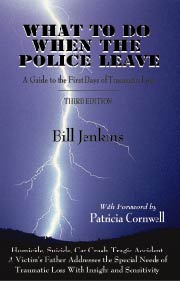NOVJM embraces all victims families of those killed by teens, no matter their position on offender sentencing.
And while NOVJM disagrees mightily with the conduct of the Coalition for the Fair Sentencing of Youth, along with other juvenile justice advocates nationally, who will not speak to ALL victims families and will not include anyone who does not agree with them in their policy discussions – only those who agree with them that the killers should be released – we will not emulate that bad behavior. We embrace all victims families and recognize all points of view.
Victims’ families views on what the offender sentence should be vary widely. Our experience is that most victims families are so paralyzed with grief that they cannot think about anything else, so many of them are passive participants at best in the criminal justice process. And that is perfectly fine – victims families should choose for themselves the journey that they take after the crime. Each will make different choices.
Some victims families support the strongest possible sentence for the offender, usually born out of the understanding that no penalty is ever enough for murder. Others become very involved with offender for deeply personal reasons, sometimes coming even to advocate for them, and for leniency. Many, many victims hold a very nuanced position such as opposing the death penalty but supporting life without parole – seeing a significant difference between those two sentences.
RESPONSIBLE REPORTING
We urge the news media to also be responsible in their reporting in acknowledging that the victims families mentioned below do not represent the majority of victims families of these crimes. Balanced and accurate reporting should always be the goal of any journalist.
OF INTEREST
Victims families speak for offender release in California
A victim’s family fights for release of the offender in Michigan
http://www.npr.org/2012/03/24/149297297/unlikely-advocates-for-teen-killers-victims-families
Jeanne Bishop publishes Change of Heart – 2014
Unlikely Advocates For Teen Killers: Victims’ Families
Laura Sullivan and Lauren Silverman
March 24, 2012
The Supreme Court heard arguments this week about the fate of 2,500 offenders
who were sentenced as teenagers to life in prison without the possibility of
parole. Seventy-nine of them were 13 or 14 when they committed their
crimes.
Many prosecutors and family members of victims spoke out about the need to
keep the sentences in place.
But in a small building cafeteria, just a few blocks from the Supreme Court,
a different group of family members quietly came together. These were the
families of teenagers who committed horrible crimes — and sitting next to them
were the families of victims.
One man’s mother had been killed by four teenage girls. Another man’s son was
killed by a teenage boy. Yet all of them want the court to find life without
parole for juveniles unconstitutional.
It’s not a group you often hear about. Many in the room said they frequently
are unwilling to share their feelings about the issue because they have been
accused of not missing their loved ones enough. On this day, there was enough
sorrow in the room to fill an afternoon — but also enough
forgiveness.
‘He Was An Animal’
Mary J ohnson said it took her more than a decade to get here. She was at
work in Minnesota 19 years ago when her sister-in-law called and told her her
20-year-old son Laramiun had been shot and killed at a party.
Three days later, a detective called and said police had picked up a
16-year-old boy named Oshea Israel.
“He was an animal,” Johnson says. “I wanted him charged as an adult with
first-degree murder, imprisoned for the rest of his life. I mean I hated
Oshea.”
Sitting off to the side of the group, Johnson smiles and looks directly
across the table — at Oshea Israel.
Asked if he killed Laramiun, Israel says quietly: “Yes, I did. Yes, I did. I
was 16. He was 20. Neither one of us wanted to back down. And me being foolish
enough to think that I held the most power just because I had a gun. He and I
could have been best friends had we just taken the time to
communicate.”
Two Mothers Meeting
The families came together at the behest of the Campaign for the Fair
Sentencing of Youth, a nonprofit that seeks to bring families and sometimes even
perpetrators to the same table.
But how Oshea Israel and Mary Johnson ended up sitting here is mostly a
testament to Johnson.
Israel was initially facing life in prison without parole, but the judge
lessened the charge and sentenced him to 25 years, most of which he served. He
got a few years off for good behavior. It was a long time since that night at
the party. He says as a 16 year old, none of it really registered.
“All I could do was shut down and numb myself to it,” Israel says. “It wasn’t
until years later that I started to make that connection, like — Wow, I really
did do this. I was responsible for someone losing their life.”
For a decade, Johnson struggled with grief. Then one day, she read a passa ge
in a book about two mothers who had lost sons.
The mothers were angels. One of them said she would have taken her child’s
place on the cross if she could have.
“The other mother fell on one knee and said, ‘Oh, well, you are she — the
mother of Christ,” Johnson says. “And the mother of Christ lifted her up, kissed
the tear off a cheek and said, ‘Tell me of your son, so I may grieve with you.’
And she said, ‘My son is Judas.'”
Johnson began to wonder if she could meet Israel’s mother, but she knew in
order to do that, she had to meet him.
Laying The Foundation
Early one morning in 2005, Johnson showed up at the Minnesota State
Correctional Center in Stillwater.
Israel says he was ready if Johnson wanted to yell at him or even hit him.
But what she said instead surprised him.
“I was like, ‘You don’t know me. You didn’t know my son. My son didn’t know
you. We need to lay our foundation. We need to get to know one another,'”
Johnson says. “And that’s what we did.”
They talked for two hours. Johnson had planned to visit Israel only once, but
a moment at the end of the meeting seemed to bind them together: Israel asked
Johnson if he could hug her.
“I felt like she just offered me her forgiveness,” he says. “I had nothing
else to offer her; at least I can show her some compassion.”
They met in the middle and embraced.
“I tell you I had something going on in my feet physically, moving and
stirring in my feet, and it just moved up and up,” Johnson says. “I felt this
whatever leave me. I knew that all that hatred and animosity and anger and the
bitterness … I had inside for 12 years was over.”
Coming Face To Face
Theirs is not a surprising story in this cafeteria. Ea ch of a dozen tables
held families of perpetrators and families of victims.
At one table, Sharletta Evans tells the group that 17 years ago, her
3-year-old son was killed in a drive-by shooting by two 15-year-olds.
“Casson Xavier Evans, that was my son’s name,” she says. “His nickname was
Biscuit.”
Across from her, Mona Schlautman nods her head. Her son was killed by an
adult and a teenage accomplice.
“I knew he did not get a fair trial, but I didn’t care at that time,”
Schlautman says. “I was just glad that he had been caught and locked
up.”
It takes a minute before Esa Mathis speaks up. Her son Ralph is serving life
without parole for drug racketeering.
“My son, the seeds of wrong decisions were sewn a long time before those
decisions were made,” she says. “By the time my son was 15 years old, not only
did he not have a father, but I had been married and divorced three times
because of my own brokenness and not knowing how messed up I was. I had to own a
part of that, you know?”
Trading Places
Everyone in the room wanted the teens to pay a price for their crimes, but
for every story of trauma the victims’ families shared, the teens’ families
seemed to describe an equal number of stories of trauma.
For many years Evans didn’t care that the 15-year-olds who killed her son had
hard lives, but that changed when she ran into the grandmother of one of the
boys at a food bank where they were both volunteering. Evans says she realized
either one could have been the other.
“Taking a look at my surviving son, who was 15, what if that was him?” she
says. “If … he took a life, would I want to see him spend the rest of his life
in prison? And the answer was no.”
Many say people don’t understand that they’re not trying to let the teens off
the hook. What they want is for the teens to have a chance to one day make
amends; getting to that place has brought them peace.
“The fact that my son died in my own arms and covered me with his own blood,”
Evans says, “I suffered. It wasn’t nothing to take lightly the fact that he was
only 3. He never made it to kindergarten. That only makes it harder. So no one
can judge how much I’ve suffered.”
Retribution And Rehabilitation
In the next few months, the Supreme Court will rule whether life without
parole can be given to teenagers. Experts have argued that teenagers’ brains are
less developed — they are more impulsive and less able to weigh the consequences
of their actions. But prosecutors say the sentence is an important
tool.
“Thirty-nine states passed laws to provide that in the rarest of cases, life
without parole for a juvenile can be a possibility ,” says Scott Burns, head of
the National District Attorneys Association. Burns wrote a brief to the court
arguing the sentence should not be overturned.
“If they were repealing all these laws, that would show … a consensus the
other way,” he says, “but that’s not happening in America.”
Asked if he thinks a teenager’s ability to change and express remorse is
worth something to society, he said: “Well, that’s the debate, isn’t it? Is it
the goal to rehabilitate someone to see if they change? Or is the goal to do
justice for the victims and others?”
But for Mary Johnson, rehabilitation is retribution. She says she knows this
because she sees it every day; not long after Israel was released from prison,
he rented the apartment next door.
“I’m in his business,” Johnson says, laughing.
But Israel says he doesn’t mind. “I really know she’s in my business out of
care and concern, like she really wants to make sure I [am] the best person I
can,” he says. “She doesn’t want to see me suffer. Just knowing that I caused
her pain and she is the person who protects me from it, it’s like —
wow.”
“He’s suffered enough for what he’s done,” Johnson says. “Young people
deserve to have a second chance. We all deserve to have a second chance, I
believe.”
Every day Israel checks in on Johnson. They spend their weekends
together.
Johnson looks across the table at a man, no longer a child, who two decades
ago killed her 20-year-old boy. To me, she says, Israel is like a
son.











